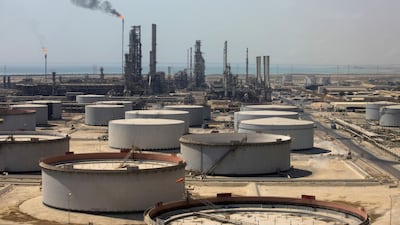Planned and committed energy investment in the Middle East is expected to fall 18 per cent over the next five years, the Arab Petroleum Investments Corporation said.
The projected decline has been attributed to the Covid-19 pandemic, lower oil prices and demand and a looming financing crisis.
The multilateral lender slashed its five-year outlook to $792 billion from $965bn.
"The hit is much higher. It is more than 30 per cent in parts of the value chain," Apicorp chief economist Leila Benali told The National.
A recovery in energy investments could take up to "two to three years" she said.
However, the GCC, which accounts for much of the oil production and exports in the Middle East and North Africa, registered a 2.3 per cent increase in committed investment, compared with 6 per cent for the region as a whole.
The increase indicated a higher project execution in Gulf economies, Apicorp said.
The economies of the Middle East will probably experience a W-shaped recovery, characterised by a rapid recovery, followed by a second period of recession, the bank’s chief executive Ahmed Ali Attiga said.
"The impact of Covid-19 is already deeper and longer lasting than past downturns. Indeed, the nature of this triple crisis and the profound restructuring in oil and gas will hit energy investments for a potentially long period of time, sowing the seeds of supply crunches and price volatility," he said.
Investment in gas will pick up over the five year period as Opec producers in the Middle East cut back on oil production to comply with the group’s output curbs.
Gulf producers such as Saudi Arabia and the UAE have also put a priority on the development of their gas reservoirs to meet growing power demands and boost future exports.
"The gas value chain registered the highest increase in planned investment compared to the 2019 outlook at $28bn, or 13 per cent, [after the development] of unconventional gas, namely [the] Jafura, Hail and Ghasha [plants] in the GCC, and increasing production capacity in Qatar, Egypt and Oman,” Apicorp said.
The region's power sector registered a $114bn decline due to the commissioning of several projects in Egypt, the UAE and Saudi Arabia in 2019.
"The dynamics that we are seeing in the gas sector in the region are different from those outside the region," Ms Benali said.
"The trends that we are seeing in our region as far as the gas value chain are very different. You have in this region, a concentration of low-cost, low-carbon producers such as Qatar who are preparing to take advantage of the situation to gain market share during this global reset."
Saudi Arabia is set to account for $39bn in gas investment. The kingdom is also expected to spend up to $41bn in power projects.
Iraq, Opec's second-largest producer, is expected to invest $33bn in the rehabilitation of its war-damaged utilities sector.
The UAE, which intends to raise production to 5 million barrels per day by 2030, could invest $45bn in the sector.
In North Africa, Egypt could attract as much as $38bn towards its petrochemicals industry.



